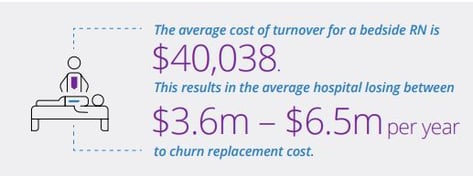
Companies have learned the incredible value of implementing and utilizing employee recognition programs to reward and retain their current staff, in addition to helping them attract new employees. In healthcare where success is measured by the quality of care patients receive, the importance of recognition is even greater.
Healthcare organizations are currently facing unprecedented challenges, hospitals filled to capacity, increased demand for quality of care, and limited resources. And at the same time, they are challenged with historically low operating budgets and costs that continue to rise.
Enhancing employee recognition is not a complete solution for these challenges, but more and more leading hospital systems are implementing formal employee recognition programs to try and retain employees and manage productivity.
Happy Caregivers Equals Happy Patients
Caregiver recognition supports staff AND patients. The quality of care patients receive is directly tied to engaged and motivated caregivers. The everyday stress of being a caregiver becomes heightened when capacity is at its highest and when more intensive care is needed without additional resources.
Caregiver satisfaction directly affects the quality of patient care. A 15% increase in patient safety occurs when a healthcare team is highly engaged. This has a direct impact on patient satisfaction — and that, in turn, has a direct effect on HCAHPS ratings.
Caregiver Burnout
During the COVID-19 crisis, healthcare employee burnout was a huge problem. Nurses were hit especially hard. Surveys showed that during the height of the pandemic, nurses experienced increased emotional exhaustion, feelings of depersonalization, and a lack of personal accomplishment, leading to lower productivity levels.
Making sure healthcare employees know how valued and appreciated they are can help them cope with the stress of their jobs and possibly avoid burnout.
High Cost of Healthcare Turnover
Turnover in healthcare is high which has significant financial consequences for the organization. Physician turnover alone can reach as high as $1 million per role, according to an article in Recruiting Physicians Today.

Hospital employee turnover rates have increased and are significantly higher than in other occupations. While turnover rates of different roles within the healthcare sector vary, some are very high with over 35 percent turnover. According to the U.S. Bureau of Labor Statistics, the average turnover rate in the U.S. is about 13 percent — which places healthcare way above average.
Look at these examples of turnover rates:
- Certified nursing assistants 27.7 percent
- Physician assistants 14.2 percent
- Patient care techs 19.3 percent
The lack of recognition and engagement contributes significantly to employee turnover. According to the Society for Human Resource Management, at least 90 percent of HR professionals believe recognition and reward influence employees to stay in their jobs.
Attracting Caregivers Is Essential
In addition to trying to retain employees, healthcare systems must make a concerted effort to attract new employees, and in today’s competitive healthcare market, this can be very challenging. Nursing jobs are expected to grow about 15 percent faster than any other occupation through 2026. According to the American Nurses Association, there will be more registered nurse jobs available through the end of 2022 than any other profession in the United States.
Hospital systems need to prioritize and invest in attracting talented employees in a very competitive marketplace. They must understand the concerns among healthcare candidates, including a lack of recognition and appreciation. Formal employee recognition programs can help eliminate this concern among job candidates.
Incentra has helped many leading healthcare organizations create and implement employee recognition programs. Click here to read one of our case studies to see how we helped Orlando Health revitalize its recognition program. Contact us to see how we can help you in this highly competitive market.
(This blog post is an excerpt from our technology partner WorkStride’s publication The Healthcare Employee Recognition Playbook.)

